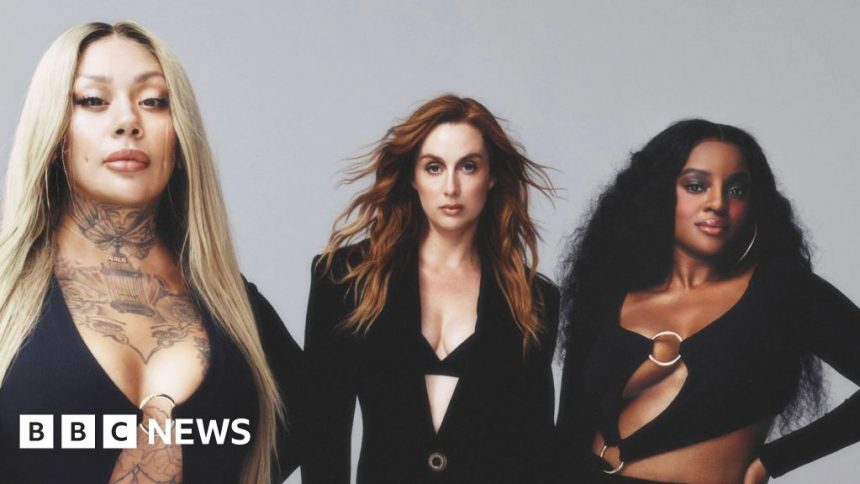How Sugababes paved the way for pop at Glastonbury
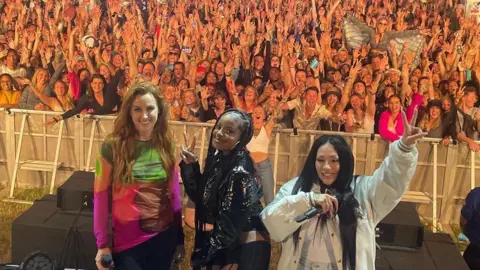 Sugababes / X
Sugababes / X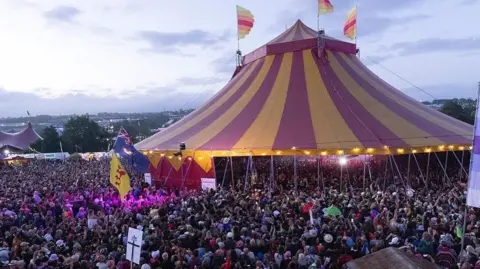 Sugababes / X
Sugababes / XAll of a sudden, the police arrive.
It’s 2022 and we’re in Glastonbury’s Avalon field. It’s a chilled-out area where “travellers come to rest their weary legs,” according to the festival’s website.
You can buy hot buttered crumpets or kick back with a pint of local ale. The music tends to be less frenetic, the atmosphere more kid-friendly.
Then Sugababes turn up.
The day one line-up of Keisha Buchanan, Mutya Buena and Siobhan Donaghy had reclaimed the rights to their band name in 2019 – but thanks to pandemic-shaped delays, this was only their second gig back.
“I remember quite vividly that Mutya, in particular, didn’t think anyone would come to see us,” says Donaghy.
Instead, the crowd swelled to such a size that the tent could have been filled five times over. Shortly before they took to the stage, the field was shut down. All traffic suspended. Police guarding the gates.
“It was quite overwhelming,” Siobhan recalls. “All this extra security arrived and we got a safety briefing moments before going on stage.”
“We thought someone famous had turned up,” laughs Keisha.
But they were the celebrities.
Fans who couldn’t get into the field resorted to peering through hedges and over fences, as the tent ropes thrummed to a flawless set of pop hits: Push The Button, Overload, Hole In The Head, About You Now, Freak Like Me.
“I’m pretty sure I came off stage in shock,” Siobhan says.
“Every performance is special – but filling up that tent felt really impressive,” says Mutya.
“Obviously everyone wants to be on the main stage, but I thought Avalon was amazing.”
This year, the band have received a significant upgrade – playing the festival’s third-biggest stage, West Holts, on Friday evening.
It will be Siobhan’s first time on one of the outdoor stages, but Keisha and Mutya previously played the Pyramid in 2003, after the first Sugababes line-up shuffle.
Back then, the trio were considered a risky booking.
“We were one of the first, if not the first, female pop band to play the main stage,” says Keisha.
“It was very controversial at the time. I remember having conversations about what to do if anyone threw a bottle of pee at us.”
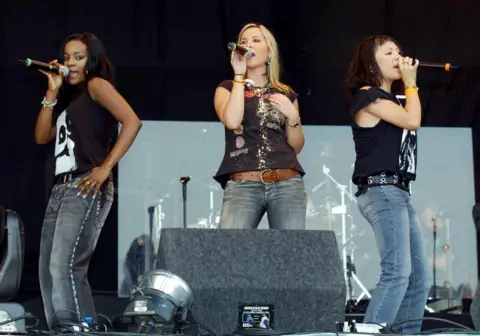 PA Media
PA MediaMutya memorably took to the stage that year in a Bob Marley T-shirt. I’d always wondered if that was an olive branch to festival-goers raised on rock and indie?
“Nah, the Bob Marley T-shirt was just because I’m a big fan of his,” she cackles.
“I feel like, by then, we’d already been able to kind of cross over into different genres of music. We’d done the NME tour and the Brits, so I felt like we’d already made a name for ourselves.
“But we were definitely conscious of leaving the heels at home,” recalls Keisha.
“I think Mutya and I wore trainers. We were just like, ‘This is not that crowd’.”
‘There was a lot of naievty’
The path they paved now stretches all the way to the top of the bill.
These days, it’s not unusual to see pop acts like Billie Eilish or Dua Lipa in headline slots.
And it’s fitting that Sugababes were first. Alongside All Saints (with whom they shared a manager), they shattered the idea of what girl bands could be in the late 1990s and early 2000s.
Their use of negative musical space, hip-hop beats and vocal harmony set them apart from the sugar rush of post Spice-Girl pop.
Eschewing dance routines and matching outfits, they seemed like a cooler alternative to the mainstream – an impression only enhanced by their teenage disinterest in speaking to, urgh, journalists.
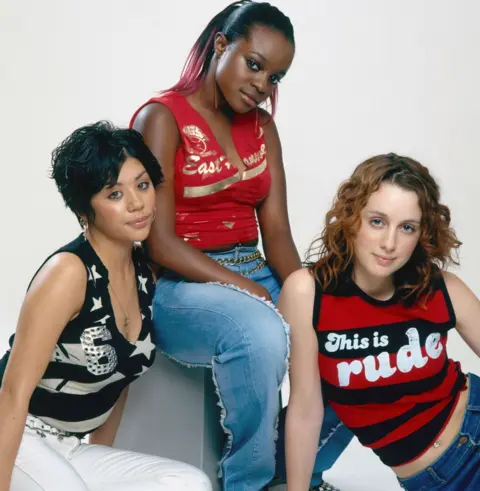 Getty Images
Getty ImagesThe band formed in north London in 1998, initially as the Sugababies, when all three members were barely in secondary school.
Before long, they had a recording contract with London Records and found themselves whisked into the process of making an album.
“We’d leave school and stay in the studio until six in the morning, then go home, take a quick shower and leave back to school,” recalls Keisha.
“I wouldn’t advise that to any other kid coming into the industry. But there wasn’t a pressure to be successful – we just loved music.”
They emerged with the minimalist, sophisticated R&B single Overload in September 2000.
Co-written by all three members, it was a coming-of-age story about friendships and boys, ripped from their conversations in the studio.
The vocals may have been recorded in one take on a handheld microphone – but Overload reached number six in the UK charts, kicking off a run of 26 consecutive top 40 hits.
Suddenly, Sugababes were in demand.
“We were constantly travelling,” recalls Mutya. “Germany. We spent a lot of time there.”
“There was a lot of naivety about what it would involve,” adds Siobhan. “You’d see people on Top of the Pops, but you never got to see behind the scenes.
“This was all before Pop Idol and X Factor, and we were making it up as we went along.”
The adults around the band should have protected them. Instead, they say, there was a “divide and conquer” mentality that allowed resentments to fester.
 Petros
PetrosWithin a year, Siobhan quit, to be replaced by Liverpudlian Heidi Range. Mutya was substituted for soundalike Amelle Berrabah in 2005.
Keisha stuck around until 2009, after which Sugababes limped on with Eurovision contestant Jade Ewen, like pop’s very own Ship of Theseus.
Looking back, there’s a feeling they were let down by people who treated the group as nothing more than a money-making brand.
“Children who come into the industry should have more support,” says Keisha.
“Their relationships should be supported, there should be more support around communication. It’s impossible to put all of that [responsibility] on kids’ shoulders.”
“We were too young to know we could change things,” adds Siobhan.
“That’s just not the case now. If something’s not working or we need to fine tune it, we can do that and make sure everyone around us is on the same page.
“We understand that it’s our business at the end of the day.”
New music
Despite rumours that Siobhan’s departure was the result of a massive falling out (she denies the widely-publicised story that she fled by climbing out of a toilet window), the trio never completely lost touch.
“Off and on, we’d run into each other,” Siobhan says now. “The only strain that was on the friendship was essentially the way the business was set up.”
When the fourth incarnation of Sugababes cancelled plans for an eighth album and went on hiatus in 2011, the original trio seized their opportunity.
Reunited under the name Mutya Keisha Siobhan, they made their first public appearance in 11 years by attending the opening ceremony of the 2012 Summer Olympics.
A single, Flatline, was released the following year but, for various reasons, the rest of those recording sessions went unreleased for nearly a decade, until 2022’s The Lost Tapes.
Now, with their comeback firmly established, they’re putting the finishing touches to what will be the first proper Origi-Babes album since 2000.
“We’ve definitely found a sound and direction,” says Siobhan.
“I’d say we are in the finishing stages, going back and forth on the tracklisting. It’s nearly there.”
All other details are being kept firmly under wraps.
“Are we allowed to say who we’ve worked with?” Mutya asks her bandmates. “I don’t know… I don’t think we should.”
“It’s really fresh and unpredictable,” says Keisha, stepping in with a diplomatically vague answer, “but keeping the formula of what people know us for”.
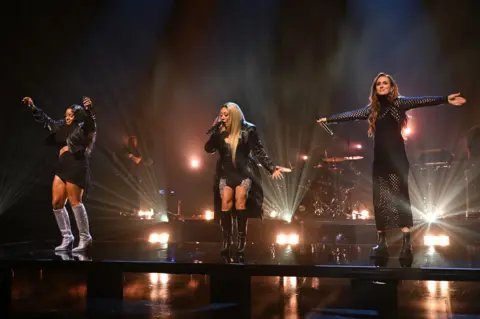 PA Media
PA MediaWhat’s evident from spending time with the trio is that they’ve put as much work into their friendship as they have the music.
Mutya and Siobhan start the call by swapping notes on Disney’s Frozen musical – which Siobhan has just endured as part of her daughter’s fourth birthday celebrations.
“We’re in our Frozen era,” she jokes. “I’ve just taken delivery of a massive Frozen balloon arch for her party. It barely fit in the door. I don’t know where to put it.”
On the tour bus, they spend their time binge-watching reality TV shows like Perfect Match and 90 Day Fiance.
“The trashier the better,” says Mutya.
“It needs to be something you don’t actually have to concentrate on, because we’re constantly talking over the top,” says Keisha.
“You know, we could stay in hotels every night if we wanted – but we tend not to,” smiles Siobhan. “It’s more fun to be together. It’s like a sleepover every night.”
Dream festival line-up
Their tourbus will speed away from Glastonbury with indecent haste on Friday, as the band have to make a gig in Morocco the following night.
However, Mutya is hatching a plan to get a weekend pass and come back for SZA’s headline set on Sunday.
“In theory we can make it, ladies,” Keisha laughs.
Mutya’s enthusiasm reminds us of an interview she gave to this website in 2003, where she was asked to choose her dream festival line-up.
“Oh no, who did I chose?” she grimaces.
But she’s pleasantly surprised by her choices: Christina Aguilera, 50 Cent, B2K, Dizzee Rascal, Avril Lavigne, Evanescence, Chaka Khan (“who’s a bit of a legend”), plus some UK garage DJs.
“To to be honest, there’s probably one or two I’d change,” she says, “but I like that little list.
“Chaka Khan’s amazing. I’m glad I said her.”
Maybe she’d be good for the legend slot next year… Unless Sugababes beat her to it.





